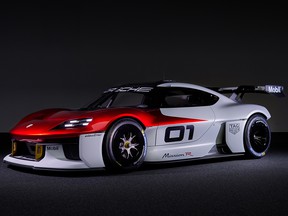First Look: Porsche’s first all-electric “Cup” car promises emissions-free speed
First Look: Porsche’s first all-electric “Cup” car promises emissions-free speed

Article content
I suppose it was only a matter of time. After all, Volkswagen – the Group, not the specific automaker — has made no bones about its complete conversion to electric vehicles. VW — the automaker this time, not the Group — is, in an effort for redemption after Dieselgate, totally committed to electric vehicles. Likewise, Audi is being extremely aggressive about electrification and Porsche is the first legacy automaker looking Tesla straight in the eye, its Taycan taking on Silicon Valley Model S head on.
Advertisement
Article content
The advantage of being Porsche is that you have multiple profit channels, just one of which happens to be building customer racecars. Whether they be street legal track cars (the GT2) or racing-only homologations specials (GT3 Cup) or track-focused cars with no specific racing purpose (like the 2019 935) other than letting rich wannabes pretend they’re Patrick Dempsey, Porsche make s^!tloads of money selling cars designed to circumnavigate closed course racing circuits as quickly as possible. There are no less than 30 one-make racing series around the world running some form of “Cup” car.
Advertisement
Article content
And soon there will be an electric version.
Oh, for now the company is calling this first look a concept, but let there be little doubt that sometime in the near future, Weissach will be producing all-electric race cars for future one-make series that look very much like this Mission R.
That means it will be physically about the size of a Cayman, weigh somewhere in the vicinity of 1,500 kilograms and will, in qualifying mode, boast 1,073 horsepower from its two electric motors. There’s 80 kilowatt-hours of battery built into its sub-floor that powers a 320-kilowatt motor up front and an even more powerful 480-kW powerpack out back, the whole shaboodle running on a 900-Volt upgrade of Porsche’s 800V architecture which is already the industry’s state of the art. In terms of performance, Porsche says that it will accelerate to 100 kilometres an hour in just 2.5 seconds, top out somewhere around 300 kilometres an hour and scoot around a racetrack about as fast as a GT3. In other words, it’ll be a bona fide racecar. Porsche also says those 80 kWh are good for some 30 minutes of flat-out racing and when charging at 340 kW it can recharge in 15 minutes. Porsche is even going to engineer a portable charging station that (very rich!) owners can take to tracks that lack high-speed recharging.
Advertisement
Article content
There will be a caveat here, of course. That 15-minute charge only gets you a 75 per cent charge — more specifically from 5 to 80 per cent state of charge (SoC) — which means that for every 22 minutes of racing, you’ll have to stop for a 15-minute recharge. Mission Rs, it seems, will face the same problem as all EVs do — they can go fast or they can go far, but they can’t do both. In other words, there will be no endurance racing EVs for the time being, even if they are massively powered Porsches.
That said, the Mission R will make a great single-make Cup racer. Porsche has already proven, with the Turbo S version of its ginormous Taycan, that it can make electric power track worthy. Packaging all that goodness into a dedicated racecar that is shorter, wider and lower than a Cayman R with all the aerodynamic benefits that an electric platform engenders pretty much guarantees it will be an absolute weapon on the track. Driving will be amongst the first to sample the Mission R. It can’t arrive soon enough.











